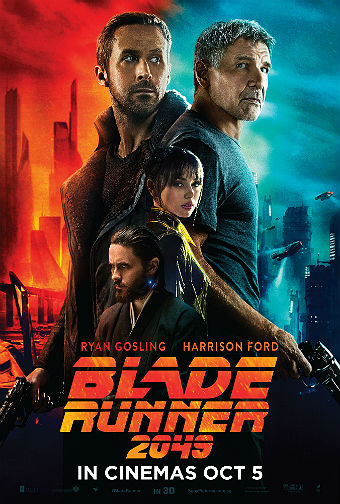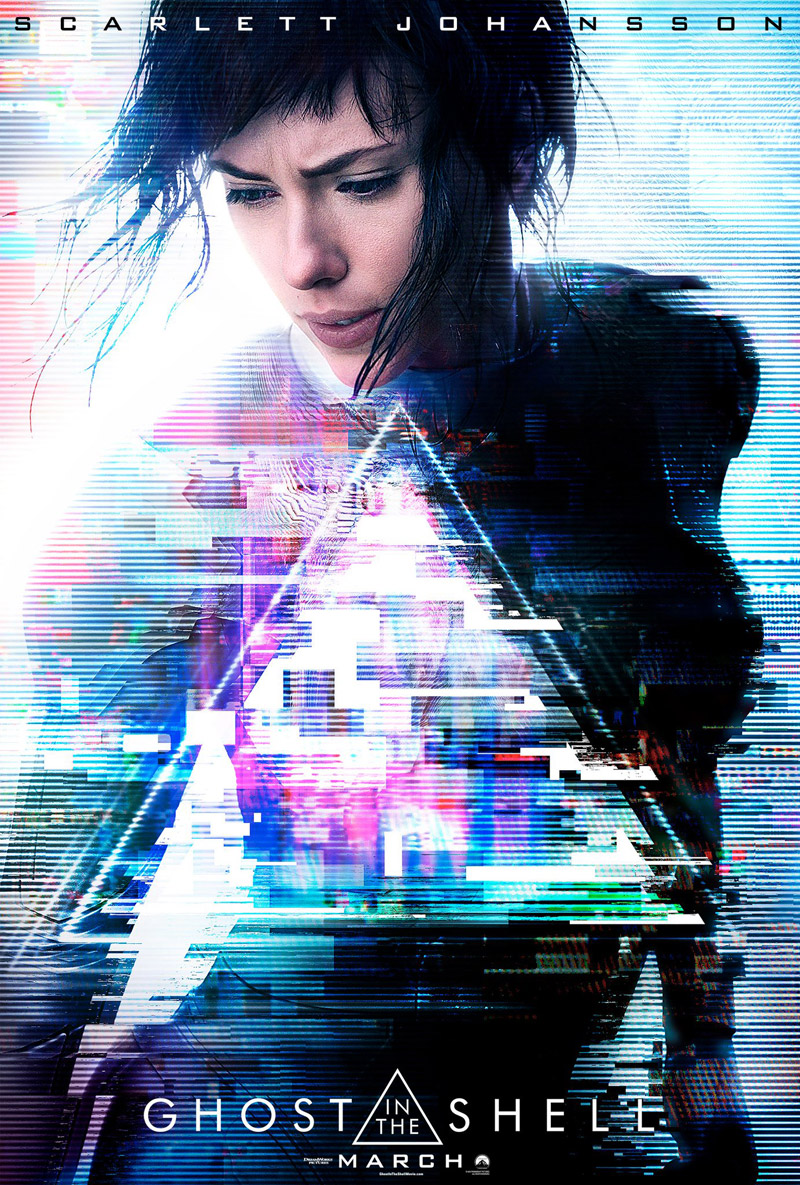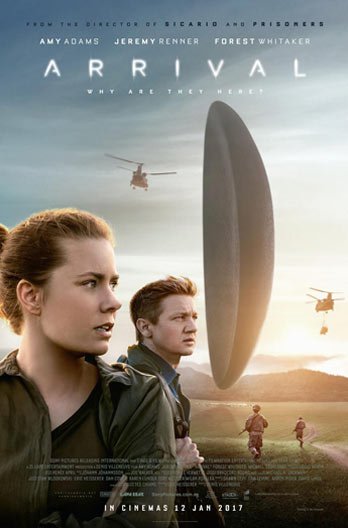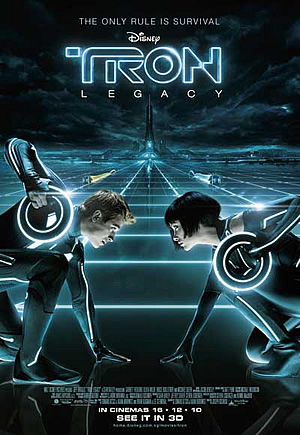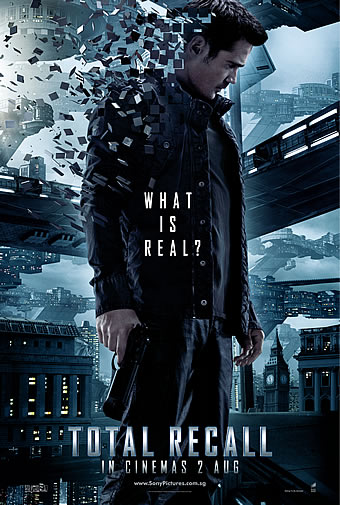BLADE RUNNER 2049 (2017)
Genre: Sci-Fi/Thriller
Director: Denis Villeneuve
Cast: Ryan Gosling, Harrison Ford, Ana de Armas, Sylvia Hoeks, Robin Wright, Jared Leto, Mackenzie Davis, Dave Bautista, Lennie James, Hiam Abbass, Barkhad Abdi, Sean Young
Runtime: 2 hrs 34 mins
Rating: NC16 (Violence & Some Nudity)
Released By: Sony Pictures Releasing International
Official Website: https://www.facebook.com/BladeRunner2049/
Opening Day: 5 October 2017
Synopsis: Thirty years after the events of the first film, a new blade runner, LAPD Officer K (Ryan Gosling), unearths a long-buried secret that has the potential to plunge what's left of society into chaos. K's discovery leads him on a quest to find Rick Deckard (Harrison Ford), a former LAPD blade runner who has been missing for 30 years.
Movie Review:
A sequel nobody could have expected to a sci-fi flick whose cult success nobody could have predicted, French-Canadian director Denis Villeneuve’s Blade Runner 2049 needs little introduction to self-respecting genre fans as one of the year’s most eagerly anticipated releases. The year then was 2019 in the dystopian universe of Ridley Scott’s trailblazing predecessor Blade Runner (under two years from where we are right now) and the events depicted here transpire thirty years on – a roughly commensurate amount of time it’s taken for this reboot of the ’80s classic to materialise. Given the unique confluence of celluloid/real-world timelines, it seems as good a time as any to revisit how our modern-world anxieties have changed since. And we can only say this: to be able to witness the mesmerising spectacle that is Blade Runner 2049 on the big screen reminds us that it’s a good time to be alive.
Originally based on Philip K. Dick’s 1968 novel Do Androids Dream of Electric Sheep?, the Los Angeles introduced by Scott’s cinematic forerunner was a rain-soaked, futuristic but dreary metropolis filled with “spinners” (not of the fidget variety, but three-wheeled flying cars), Japanese-influenced neon billboards and whatever’s left of the human population that hasn’t vacated Earth for “off-world” settlements. “Replicants” were human-like androids bio-engineered for slave labour and Rick Deckard (Harrison Ford) was our star “blade runner” back in the day – the term for police agents who killed off or “retired” renegade replicants before they could rebel against humankind. Except that he fell in love and made off with one from the other team named Rachael (Sean Young), leaving in the first instalment’s wake a host of open-ended philosophical and plot-related questions for audiences to ponder upon.
Backstory and nomenclature aside, cut to three decades on: in 2049, blade runners still travel on spinners, they persist in their dogged hunt for rogue replicants, replicants in general remain despised by humans and Los Angeles continues to be a shithole to live in – that much doesn’t change. The sense of continuity that pervades on screen owes a significant debt to the people behind it: even as Scott handed over directorial reins to Villeneuve (the latter was responsible for last year’s spellbinding sci-fi thrillerArrival), the former retained producer duties on this one; original co-screenwriter Hampton Fencher also joined forces with Michael Green (Logan; Alien: Covenant) for this latest outing. But rather than discuss more of the same, we’d much rather go into how the potent mix of old and new blood among its cast and crew has taken the blueprint of the original and metastasised the architecture of its diseased world into a fuller form on so many levels, it’s truly a product to marvel at.
For one, story-wise at least, the focus has shifted to young blade runner K (Ryan Gosling), who himself is – horror of horrors – a replicant, albeit of a newer, improved and presumably more subservient iteration. By day, he hunts and retires other errant, older-model replicants while by night, he returns to the synthetic (yet debatably authentic) embrace of his high-functioning, artificially-intelligent hologram girlfriend, Joi (Ana de Armas). When K inadvertently uncovers a secret with the potential to spark a full-blown conflagration between replicants and mankind, his boss (Robin Wright) orders K to track it down and destroy it. But he develops some ideas of his own and embarks on a concurrent journey in search of his own past and identity that eventually leads him to Deckard (thankfully reprised by Ford himself). Hot on K’s heels are replicant manufacturer Niander Wallace (Jared Leto) and more specifically, his ruthless henchwoman Luv (Sylvia Hoeks), who have their own vested interests in the earth-shattering secret.
Beyond the above, any further revelation of specific plot points on our part would ruin a first-timer’s experience of the storyline. Scott’s Blade Runner was less concerned about the sophistry of its story arc than examining its many philosophical themes under a cloudy, murky veneer: the ethical issues behind human genetic engineering, the authenticity of human memory, whether a machine that thinks and feels is still a machine and ultimately, what it means to be human. In contrast, Villeneuve’s film attempts all of the same themes while upping the quotient on delivering a more compelling narrative, and he sure isn’t in a haste to tell the story here. Pieces of the exposition are painstakingly engineered and sequenced over the luxurious running time of more than two and a half hours, alternating between quick bursts of blockbuster-style action sequences and slow, pensive shots that are bound to draw comparisons to Russian director Andrei Tarkovsky. And yet there is nary a scene that feels overtly gratuitous.
Sure, it could be argued that it’s the subliminal ambiguity of how Scott’s pioneering film hung together that makes fans revisit it time and again, since there is little to spoil plot-wise as opposed to Blade Runner 2049, but there is so much textural richness in Villeneuve’s expansive follow-up that begs further exploration. If the existentialist questions posed were mostly to be inferred in Scott’s precursory flick, Villeneuve’s take delves deeper into them, even laying bare a few by having his characters pose them point-blank in dialogue. “To be born is to have a soul,” K muses on one occasion, while Deckard asks him during another instance: “Who am I to you?” As the case was thirty years ago, there aren’t easy answers either this time around, which still affords us plenty to ruminate on for a long time after the novelty of the 2049 storyline wears off. Even if the filmmakers aren’t prescriptive on this count, they make us feel for its emotionally complex characters (especially the non-human ones) and it’s our empathy that at least reminds us of one aspect of being human. K’s Kafkaesque trajectory in the film reaches heart-breaking proportions (his moniker most likely a nod to Josef K., alienated protagonist of Kafka’s stories) and the pathos in Gosling’s performance shows he is perfectly cast. We struggle to think of a better Hollywood A-lister male actor to play a replicant with burgeoning human-like sensibilities than Gosling, whose deadpan, masculine exterior belies an unspeakable vulnerability.
And then of course there are the glorious visuals to bask in, which we could go and on about, thanks mostly to cinematographic genius Roger Deakins and production designer Dennis Gassner. Geographically, the film moves the action from Los Angeles to other areas such as San Diego (a mountainous garbage dump for foragers) and Las Vegas (an uninhabitable radioactive wasteland with emptied-out casinos), all gorgeously rendered in a neo-noir palette that ranges from cityscapes in drab grey to skies in sickly saffron hues. In a nod to the retrofitted alternative universe of its predecessor, fans will be pleased to see defunct brands like Pan-Am and Atari remaining alive and well on the billboards of Los Angeles. The special effects team manages to conjure some sexualised hologram sequences that are frankly stunning to behold. And in terms of sound, Hans Zimmer and Benjamin Wallfisch’s effective score only vaguely echoes Vangelis’ seminal synth-beat melody, delivering fresh aural punches with rumbling ferocity and impeccable timing.
Is this movie for the masses? It’s not your average popcorn action thriller flick, that’s for sure, and if that’s your thing, you shouldn’t be guilt-tripped for not enjoying this movie as much as you thought you should have. But it’s an exceedingly well-made film that tries to meld high art with blockbuster storytelling and fans of the original should adore it for the most part. Only time will tell if it manages to reach the hallowed ranks of the first Blade Runner, but in the meantime there’s one thing I’m certain of – I cannot wait to re-watch this on the big screen again. And again.
Movie Rating:





(No cheap replicant, Blade Runner 2049 is a visually sumptuous, deliciously cerebral sci-fi thriller that emerges tall from the behemothian shadows of its predecessor as one of the best of its kind in recent memory)
Review by Tan Yong Chia Gabriel
You might also like:
